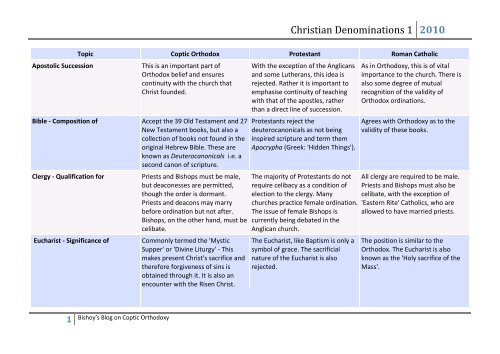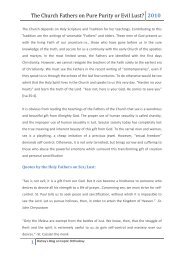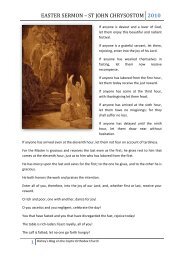Christian Denominations 1 - WordPress â www.wordpress.com
Christian Denominations 1 - WordPress â www.wordpress.com
Christian Denominations 1 - WordPress â www.wordpress.com
You also want an ePaper? Increase the reach of your titles
YUMPU automatically turns print PDFs into web optimized ePapers that Google loves.
<strong>Christian</strong> <strong>Denominations</strong> 1 2010<br />
Apostolic Succession<br />
Topic Coptic Orthodox Protestant Roman Catholic<br />
This is an important part of<br />
Orthodox belief and ensures<br />
continuity with the church that<br />
Christ founded.<br />
Bible - Composition of Accept the 39 Old Testament and 27<br />
New Testament books, but also a<br />
collection of books not found in the<br />
original Hebrew Bible. These are<br />
known as Deuterocanonicals i.e. a<br />
second canon of scripture.<br />
Clergy - Qualification for<br />
Eucharist - Significance of<br />
Priests and Bishops must be male,<br />
but deaconesses are permitted,<br />
though the order is dormant.<br />
Priests and deacons may marry<br />
before ordination but not after.<br />
Bishops, on the other hand, must be<br />
celibate.<br />
Commonly termed the 'Mystic<br />
Supper' or 'Divine Liturgy' - This<br />
makes present Christ's sacrifice and<br />
therefore forgiveness of sins is<br />
obtained through it. It is also an<br />
encounter with the Risen Christ.<br />
With the exception of the Anglicans<br />
and some Lutherans, this idea is<br />
rejected. Rather it is important to<br />
emphasise continuity of teaching<br />
with that of the apostles, rather<br />
than a direct line of succession.<br />
Protestants reject the<br />
deuterocanonicals as not being<br />
inspired scripture and term them<br />
Apocrypha (Greek: 'Hidden Things').<br />
The majority of Protestants do not<br />
require celibacy as a condition of<br />
election to the clergy. Many<br />
churches practice female ordination.<br />
The issue of female Bishops is<br />
currently being debated in the<br />
Anglican church.<br />
The Eucharist, like Baptism is only a<br />
symbol of grace. The sacrificial<br />
nature of the Eucharist is also<br />
rejected.<br />
As in Orthodoxy, this is of vital<br />
importance to the church. There is<br />
also some degree of mutual<br />
recognition of the validity of<br />
Orthodox ordinations.<br />
Agrees with Orthodoxy as to the<br />
validity of these books.<br />
All clergy are required to be male.<br />
Priests and Bishops must also be<br />
celibate, with the exception of<br />
'Eastern Rite' Catholics, who are<br />
allowed to have married priests.<br />
The position is similar to the<br />
Orthodox. The Eucharist is also<br />
known as the 'Holy sacrifice of the<br />
Mass'.<br />
1<br />
Bishoy’s Blog on Coptic Orthodoxy
<strong>Christian</strong> <strong>Denominations</strong> 1 2010<br />
Eucharist - Presence of Christ in<br />
Eucharist - Distribution of<br />
Holy Spirit<br />
Marriage and Divorce<br />
During the Eucharist, the Priest calls<br />
down the Holy Spirit (in Greek:<br />
epiklesis) upon the gifts (the bread<br />
and the wine). They then change<br />
into the actual body and blood of<br />
Christ. The precise way in which this<br />
happens is a divine mystery.<br />
The consecrated elements can only<br />
be received by members. Orthodox<br />
policy is to <strong>com</strong>municate in both<br />
kinds (i.e. both bread and wine are<br />
given to those present).<br />
The third person of the Trinity,<br />
proceeding from the Father alone as<br />
in the original Nicene Creed. The<br />
Father sends the Spirit at the<br />
intercession of the Son. The Son is<br />
therefore an agent only in the<br />
procession of the Spirit.<br />
Marriage is a mystical union<br />
between a man and a woman.<br />
Divorce is generally only allowed in<br />
cases of adultery, though there are<br />
exceptions.<br />
The bread and wine, being symbols,<br />
do not change substance. There are<br />
however, a wide variety of views<br />
held within Protestantism on this<br />
subject (e.g. some Anglicans accept<br />
the Catholic view, whereas Baptists<br />
deny it).<br />
The elements are usually offered to<br />
all <strong>Christian</strong>s who feel able to<br />
partake of them. The vast majority<br />
of Protestant churches<br />
<strong>com</strong>municate in both kinds.<br />
The Holy spirit proceeds from both<br />
the Father and the Son. The Nicene<br />
creed includes the filioque (Latin:<br />
'and the son').<br />
Marriage is a contract, but is not<br />
unbreakable. Divorce is discouraged,<br />
but permitted as evidence of human<br />
weakness. Some denominations<br />
permit remarriage in church.<br />
As in Orthodoxy, the Priest invokes the<br />
Holy Spirit during the Mass. However,<br />
the consecration be<strong>com</strong>es effective<br />
through the Priest, who acts in the<br />
person of Christ. The gifts change<br />
<strong>com</strong>pletely into Christ's body and blood<br />
and this change is termed<br />
'Transubstantiation' i.e. the outward<br />
appearance remains the same, but the<br />
substance changes.<br />
As with Orthodoxy, only members of<br />
the church may receive. The bread<br />
only is given to the congregation,<br />
the Priest receiving the wine.<br />
However, some churches do<br />
<strong>com</strong>municate in both kinds.<br />
Agrees with the Protestant view.<br />
An unbreakable contract and a type<br />
of Christ and the church. Divorce is<br />
not permitted unless there is some<br />
canonical impediment to the<br />
marriage. In this situation, an<br />
annulment may be granted.<br />
2<br />
Bishoy’s Blog on Coptic Orthodoxy
<strong>Christian</strong> <strong>Denominations</strong> 1 2010<br />
Mary - Assumption and Immaculate<br />
conception of<br />
Mary - Position of<br />
Pope - Authority of<br />
The Assumption is accepted and it is<br />
agreed that Mary experienced<br />
physical death, but the Immaculate<br />
conception is rejected. Orthodox<br />
belief is that the guilt of original sin<br />
is not transmitted from one<br />
generation to the next, thus<br />
obviating the need for Mary to be<br />
sinless.<br />
Mary is venerated as Theotokos<br />
(Greek: 'God-bearer'). By this is<br />
meant that the son she bore was<br />
God in human form. She is first<br />
amongst the saints and 'ever-virgin'.<br />
As the Bishop of Rome, he has a<br />
primacy of honour when Orthodox,<br />
not of jurisdiction. At present, his<br />
primacy is not effective as the<br />
papacy needs to be reformed in<br />
accordance with Orthodoxy. His<br />
authority is thus no greater or lesser<br />
than any of his fellow Bishops in the<br />
church.<br />
Both are denied. The claim that<br />
Mary was sinless is rejected - only<br />
Christ was sinless.<br />
Mary was a holy woman who was<br />
chosen to bear the Son of God. Her<br />
perpetual virginity and intercession<br />
are denied.<br />
The Pope is the leader of the<br />
Catholic church, having no authority<br />
to speak for the church as a whole.<br />
Both are dogmas of the church. The<br />
church has not as yet decided<br />
whether Mary actually experienced<br />
Physical death. The Immaculate<br />
conception is necessary because not<br />
only do humans inherit a sinful<br />
nature, they also bear the guilt of<br />
Adam and Eve's sin. Thus being<br />
sinless herself, Mary could give birth<br />
to a sinless Christ.<br />
The view is similar to the Orthodox<br />
church - the title 'Mother of God'<br />
being used more <strong>com</strong>monly than<br />
Theotokos. In addition, it is claimed<br />
that at various points in history,<br />
Mary has revealed herself to the<br />
world in apparitions e.g. those at<br />
Lourdes.<br />
The Pope is the 'Vicar of Christ' i.e.<br />
the visible head of the church on<br />
earth and spiritual successor of St.<br />
Peter. He has supreme authority<br />
(including that over church councils)<br />
within Christendom (The Power of<br />
the keys).<br />
3<br />
Bishoy’s Blog on Coptic Orthodoxy
<strong>Christian</strong> <strong>Denominations</strong> 1 2010<br />
Pope - Infallibility of<br />
Papal Infallibility is rejected. The<br />
Holy Spirit acts to guide the church<br />
into truth through (for example)<br />
ecumenical councils. This Orthodoxy<br />
recognises the first three<br />
ecumenical councils as being<br />
infallible.<br />
Protestants also reject Papal<br />
infallibility. The only source of<br />
infallible teaching is that found in<br />
the Bible.<br />
Purgatory Does not believe in purgatory! Purgatory is rejected - Christ's death<br />
on the cross is sufficient to remove<br />
the penalty for all our sins.<br />
Sacraments<br />
Sacraments - Effect of<br />
Saints<br />
There are seven Sacraments (known<br />
as 'Mysteries' in Orthodoxy):<br />
Baptism, Chrismation, Eucharist,<br />
Confession, Holy Unction of the Sick,<br />
Holy Matrimony & Priesthood.<br />
The Mysteries convey grace to those<br />
who participate in them worthily.<br />
A special group of holy people, who<br />
are venerated. They may act as<br />
intercessors between God and Man<br />
and may be invoked in prayer.<br />
Generally, only two sacraments (also<br />
known as Ordinances) are<br />
recognised: Baptism and the<br />
Eucharist (often called 'Holy<br />
Communion' or the 'Lord's Supper').<br />
There is a diverse range of opinions,<br />
but many Protestants regard the<br />
Sacraments as symbols or reminders<br />
of Grace already given.<br />
All <strong>Christian</strong>s are saints, called to<br />
imitate Christ. Only Christ may<br />
mediate between God and Man.<br />
The Pope is infallible when, through<br />
the Holy Spirit, he defines a doctrine<br />
on faith and morals that is to be<br />
held by the whole church. This is a<br />
dogma and is therefore a required<br />
belief within Catholicism.<br />
A place of cleansing and preparation<br />
for heaven. Also a place where the<br />
punishment due to unremitted<br />
venial sins may be expiated.<br />
The number of Sacraments is fixed<br />
at seven and is the same list as that<br />
in Orthodoxy, with the exception of<br />
Chrismation, which is generally<br />
known as 'Confirmation'.<br />
Agrees with the Orthodox position.<br />
The Sacraments are signs that effect<br />
that which they signify.<br />
The position is very similar to<br />
Orthodoxy. For sainthood, it is also<br />
required that at least two verifiable<br />
miracles have occured as a result of<br />
the intercession of that person.<br />
4<br />
Bishoy’s Blog on Coptic Orthodoxy
<strong>Christian</strong> <strong>Denominations</strong> 1 2010<br />
Salvation<br />
Scripture - Importance of<br />
Worship and Liturgy<br />
Salvation is "faith working through<br />
love" and should be seen as a life<br />
long process. The Ultimate aim of<br />
every Orthodox <strong>Christian</strong> is to<br />
obtain Theosis or union with God.<br />
This is done through living a holy life<br />
and seeking to draw closer to God.<br />
There is one source of divine<br />
revelation: Tradition. Scripture<br />
forms the oral part, and the writings<br />
of saints, decisions of ecumenical<br />
councils etc. are also part of it.<br />
The 'Divine Liturgy' is the centre of<br />
Orthodox spirituality. Worship is<br />
usually in the vernacular, though<br />
Greek is also used.<br />
Salvation is the free and unmerited<br />
gift of God to man. It is obtained by<br />
grace through faith in Christ alone.<br />
Through Christ's atoning sacrifice,<br />
we are rendered acceptable to God<br />
and judged righteous (justified) in<br />
his sight.<br />
Scripture alone is the only infallible<br />
guide and the final authority on<br />
matters of <strong>Christian</strong> faith and<br />
practice (One of the foundational<br />
principles of Protestantism).<br />
There are a wide variety of worship<br />
styles. Examples include the<br />
spontaneity of the Pentecostal<br />
churches, and the more traditional<br />
worship of the Anglican churches in<br />
the Catholic tradition.<br />
We are saved by grace, but also<br />
through the merits we obtain<br />
through good works acceptable to<br />
God. As in Orthodoxy, salvation<br />
should be seen as a process rather<br />
than a once only event.<br />
Alongside Sacred Scripture, Sacred<br />
Tradition (i.e. teachings handed<br />
down from Christ and the apostles<br />
to the present) are to be considered<br />
sources of divine revelation.<br />
Tradition and scripture are<br />
interpreted by the magisterium or<br />
teaching authority of the church.<br />
Worship is centred around the<br />
Mass. Following the Vatican II<br />
council (1962-5), greater emphasis<br />
was placed on worship in the<br />
vernacular, though the traditional<br />
Latin ('Tridentine') Mass is also used.<br />
5<br />
Bishoy’s Blog on Coptic Orthodoxy




